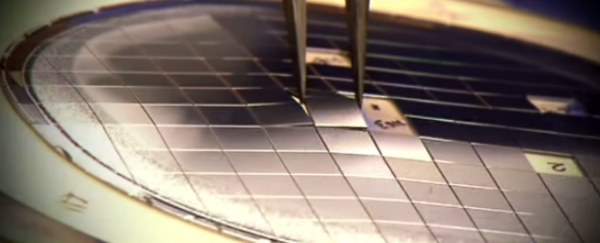Researchers in Australia have developed a patch lined with microscopic needles that can quickly and painlessly detect disease-carrying proteins in the blood, potentially replacing the need for needle-based blood samples, and time spent waiting for lab analysis.
Based on a similar patch that could one day deliver injection-free vaccines through the skin, the diagnostic nanopatch has been designed to identify diseases such as malaria and dengue fever, which are prevalent in remote areas and developing regions where people might not have the resources to routinely draw blood and analyse it.
"The concept here is that we could just put a patch on the skin and this could give a result based on what it can find in your blood," one of the researchers, Simon Corrie from the University of Queensland, told Fairfax Media. "The microneedle arrays can capture proteins that circulate around the body that are normally tested for in blood samples."
Once the patches have done their job, they're removed from the skin and exposed to specially formulated detection reagents.
The patches are like small chips made from gold-coted silicon wafers, lined with countless microneedles that are so small, you won't even feel them piercing the skin. They can reportedly detect the presence of disease carrying proteins within an hour, which means if the team can get them on the market, you won't have to see your GP to get your blood taken and then come back a few days later to get the results - you could just go for a lunch break.
They've so far only been tested on mice, but Corrie told The Sydney Morning Herald that they've been granted funding from the Australian National Health and Medical Research Council for the development of commercial prototypes for humans, that will likely be made from a type of polymer or plastic, instead of gold-coated silicon, to keep manufacturing costs down.
The next step - other than figuring out how to get them to work safely and effectively on humans - is to develop what the researchers are calling a "micro-fluidic detection card". The team expects to have this and a clinical trial with human volunteers ready in the next couple of years.
"We will be able to slot the diagnostic patch into the card that does the washing and detection steps so you don't need a lab at all to do that work," Corrie said. "As malaria is treatable, detection of the disease can avoid overtreatment in people that don't have it. Overtreatment leads to resistance and one of the biggest issues with malaria is its resistance to existing treatments."
The team will want to get a wriggle on - nanopatches have become a big thing over the past year or so, with researchers in the US working on a new insulin patch for diabetics that could potentially replace daily injections, and vaccine patches that are set to begin clinical trails in 2017. Earlier this year, it was announced that a tiny patch-like device could help treat or prevent peanut allergies by painlessly exposing a patient to a small amount of peanut extract.
Whichever invention makes it to market - hopefully all of them do, because that would be awesome - it could make a huge difference to people living in parts of the world where they don't have the facilities for safe and effective blood sample analysis and vaccination. And yes, injection-free blood tests and vaccines for the rest of us would be pretty great too.
